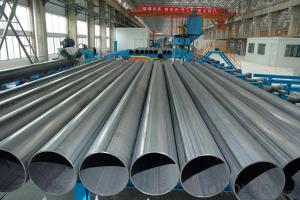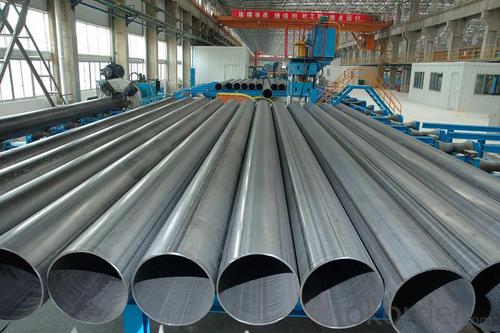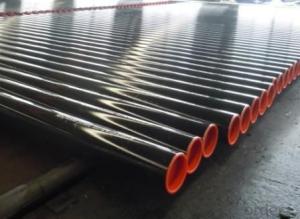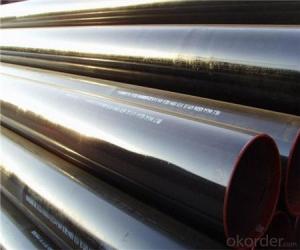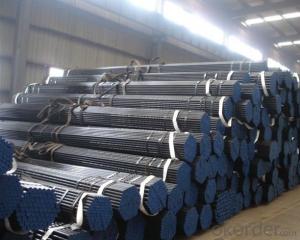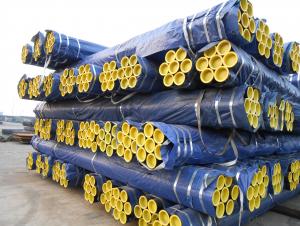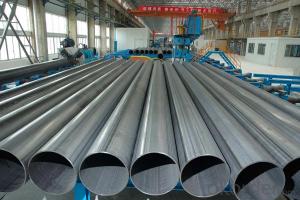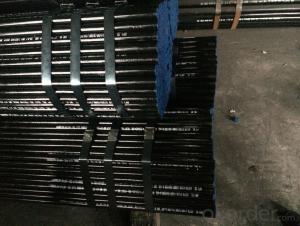Carbon Welded Steel Pipe ERW ASTM A53 API, ASTM, BS, DIN, GB
- Loading Port:
- Tianjin
- Payment Terms:
- TT or LC
- Min Order Qty:
- 20 m.t.
- Supply Capability:
- 15000 m.t./month
OKorder Service Pledge
OKorder Financial Service
You Might Also Like
1、Structure of Welded Steel Tube:
We are company that have many years experience and professional manager team and engineer team and sales team, sure we will provide you high quality of pipe and professioanl service.Welded Steel Tube is formed by drawing a solid billet over a piercing rod to create the hollow shell. We are company that have many years experience and professional manager team and engineer team and sales team, sure we will provide you high quality of welded pipe and professioanl service.
2、Main Features of the Welded Steel Tube:
• High manufacturing accuracy
• The higher strength
• The small inertia resistance
• Strong heat dissipation ability
• Good visual effect
• Satisfy price
3、Welded Steel Tube Specification:
Standard | GB, DIN, ASTM ASTM A106-2006, ASTM A53-2007 |
Grade | 10#-45#, 16Mn 10#, 20#, 45#, 16Mn |
Thickness | 8 - 33 mm |
Section Shape | Round |
Outer Diameter | 133 - 219 mm |
Place of Origin | Shandong, China (Mainland) |
Secondary Or Not | Non-secondary |
Application | Hydraulic Pipe |
Technique | Cold Drawn |
Certification | API |
Surface Treatment | factory state or painted black |
Special Pipe | API Pipe |
Alloy Or Not | Non-alloy |
Length | 5-12M |
Outer Diameter | 21.3-610mm |
Grade | 20#, 45#, Q345, API J55, API K55, API L80, API N80, API P110, A53B |
Standard | ASME, ASTM |
1) Material:20#(ASTM A 106/A53 GRB.API5LGRB,GB),45#,16Mn,10#.
2) Specification range:OD:21.3-610mm,WT:6-70mm,length:6-12m or according to the requirement of clients.
3) Excutive standards:GB,ASME API5L.ASTM A 106/A53,Despite of the above standards,we can also supply seamless steel pipe with standard of DIN,JIS,and so on,and also develop new products according to the requirements of our clients!
4) Surface:black lacquered,varnish coating or galvanized.
5) Ends:Beveled or square cut,plastic capped,painted.
6) Packing:bundles wrapped with strong steel strip,seaworthy packing.
4、Packaging & Delivery
Packaging Details: | seaworthy package,bundles wrapped with strong steel strip |
Delivery Detail: | 15-30days after received 30%TT |
5、FAQ of Welded Steel Tube:
①How is the quality of your products?
Our products are strictly in accordance with international and domestic standard. We test on every pipe before delivery. Any quality certification or testing report you want to see, please tell us.
Guaranteed: If products’ quality is not in accordance with description as we provide or the promise before you place order, we promise 100% refund.
②How about the price?
Yes, we are factory and be capable of offering you the lowest price. One of our policy is that “ to save time and be absolutely honest with our business relationship, we quote as low as possible for every client, and discount can be given according to the quantity”, if you are interested in bargain and dissatisfy our factory price, just don’t waste your time. Our quotation is professional.
③Why should you choose us?
Choice happens because of our quality and price. Additionally, we can also offer professional products inquiry, products knowledge train (for agents), fast goods delivery, outstanding customer solution proposals. Our service formula: good quality + good price + good service=customer’s trust.
SGS test is available. Customer inspection before shipping is welcome. Third party inspection is OK.
6、 Welded Steel Tube Images:
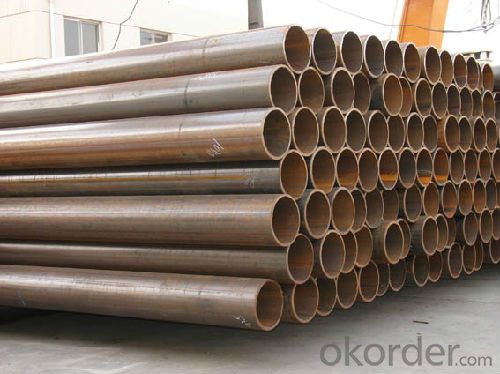
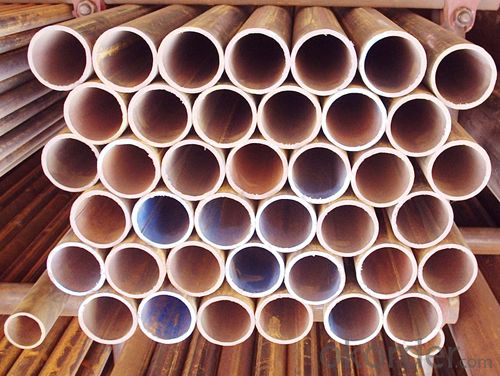
- Q: Can steel pipes be used for architectural purposes?
- Yes, steel pipes can be used for architectural purposes. Steel pipes are often used in construction projects for structural support, such as in the construction of buildings, bridges, and stadiums. They are also commonly used for architectural design elements, such as handrails, staircases, and decorative features. The durability, strength, and versatility of steel pipes make them a popular choice in architectural applications.
- Q: Can steel pipes be used for chemical refineries?
- Yes, steel pipes can be used for chemical refineries. Steel pipes are commonly used in chemical industries due to their high strength, durability, and resistance to corrosion. They can withstand high pressure and temperature conditions, making them suitable for transporting various chemicals and fluids within a refinery. Additionally, steel pipes can be easily welded, ensuring a secure and leak-proof system in chemical refineries.
- Q: Can steel pipes be used for underground cooling systems?
- Yes, steel pipes can be used for underground cooling systems. Steel pipes are often preferred for underground applications due to their strength, durability, and resistance to corrosion. They can effectively withstand the pressure and temperature requirements of cooling systems and can be used for transferring chilled water or other coolants underground.
- Q: How are steel pipes protected against external impact or mechanical damage?
- Various methods are employed to protect steel pipes from external impact or mechanical damage. One commonly utilized technique involves applying a protective coating onto the pipe's surface. This coating acts as a barrier, preventing direct contact between the pipe and external objects or forces. Coatings such as epoxy, polyethylene, or polyurethane are frequently chosen due to their excellent resistance to impact and abrasion. Another method of protection involves the use of pipe supports or clamps. These supports are positioned at regular intervals along the pipe's length, ensuring stability and minimizing excessive movement or vibration. They help distribute the load and absorb any external impacts, thus reducing the risk of mechanical damage. Additionally, steel pipes can be reinforced by wrapping them with materials like fiberglass, carbon fiber, or kevlar. These reinforcement materials provide an extra layer of strength and durability, enhancing the pipes' resistance to external impact and mechanical damage. Furthermore, burying the pipes underground or installing them within protective casings can offer an additional layer of protection. This measure shields the pipes from direct contact with external objects, reducing the potential for damage caused by accidental impacts or environmental factors. In conclusion, a combination of protective coatings, supports, reinforcements, and appropriate installation methods ensures that steel pipes are safeguarded against external impact or mechanical damage. This effectively extends their lifespan and maintains their structural integrity.
- Q: Can steel pipes be used for sewage treatment plants?
- Yes, steel pipes can be used for sewage treatment plants. Steel pipes are commonly used in sewage treatment plants due to their durability, strength, and resistance to corrosion. They are suitable for transporting sewage, wastewater, and other fluids in these facilities.
- Q: Are steel pipes suitable for underground drainage systems?
- Yes, steel pipes are suitable for underground drainage systems. They are commonly used in such systems due to their durability, strength, and resistance to corrosion. Steel pipes can effectively handle the pressure and flow of water and other fluids, making them a reliable choice for underground drainage.
- Q: How are steel pipes used in the automotive exhaust systems?
- Steel pipes are commonly used in automotive exhaust systems because steel is a durable and heat-resistant material. Steel pipes are used to transport the exhaust gases from the engine to the muffler and tailpipe, ensuring that the gases are safely and efficiently expelled from the vehicle. These pipes are designed to withstand high temperatures, corrosion, and vibration, making them an essential component in the exhaust system.
- Q: How are steel pipes protected against fire hazards?
- Steel pipes are protected against fire hazards through various methods such as fire-resistant coatings, fire wraps, or fireproof cladding. These protective measures prevent the pipes from being exposed to high temperatures and flames, ensuring their structural integrity and reducing the risk of fire-related incidents.
- Q: Can steel pipes be used for sewage disposal systems?
- Yes, steel pipes can be used for sewage disposal systems. Steel pipes are commonly used in sewage systems due to their durability, resistance to corrosion, and ability to withstand high pressure. They are suitable for carrying wastewater and sewage safely and efficiently.
- Q: What are the different pipe fittings used with steel pipes?
- Some of the different pipe fittings used with steel pipes include elbows, tees, couplings, unions, reducers, flanges, and caps.
Send your message to us
Carbon Welded Steel Pipe ERW ASTM A53 API, ASTM, BS, DIN, GB
- Loading Port:
- Tianjin
- Payment Terms:
- TT or LC
- Min Order Qty:
- 20 m.t.
- Supply Capability:
- 15000 m.t./month
OKorder Service Pledge
OKorder Financial Service
Similar products
Hot products
Hot Searches
Related keywords
